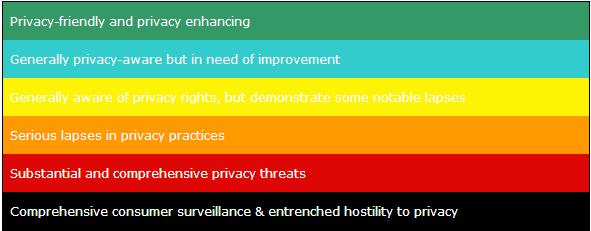Privacy International Ranks Google as “hostile to privacy”

Privacy International (PI), a human rights research and campaign organization, prepared a report following a six-month investigation into the privacy practices of key Internet-based companies. The following companies listed in alphabetical order were included in the study.
NOTE: This is not the order of privacy violation and Amazon was not the number 1 privacy violator. This is simply a list in alphabetical order of companies that were included in the study.
- Amazon
- AOL
- Apple
- BBC
- Bebo
- eBay
- Friendster
- Hi5
- Last.fm
- LiveJournal
- Microsoft
- Myspace
- Orkut
- Reunion.com
- Skype
- Wikipedia
- Windows Live Space
- Xanga
- Yahoo!
- YouTube
Based on the study, PI ranked Google at the bottom of the stack. Here are some highlights:
- “…throughout our research we have found numerous deficiencies and hostilities in Google’s approach to privacy that go well beyond those of other organizations.”
- “While a number of companies share some of these negative elements, none comes close to achieving status as an endemic threat to privacy.”
- “Google’s status in the ranking is also due to its aggressive use of invasive or potentially invasive technologies and techniques.”
- “…we have witnessed an attitude to privacy within Google that at its most blatant is hostile, and at its most benign is ambivalent.”
- “Google does not indicate how long the information collected through Google Toolbar is retained, nor does it offer users a data expungement option…”
- “Google fails to follow generally accepted privacy practices such as the OECD Privacy Guidelines and elements of EU data protection law.”
- “Google logs search queries in a manner that makes them personally identifiable but fails to provide users with the ability to edit or otherwise expunge records…”
- “Google fails to give users access to log information generated through their interaction with Google Maps, Google Video, Google Talk, Google Reader, Blogger and other services.”
- “Google has access to additional personal information, including hobbies, employment, address, and phone number, contained within user profiles in Orkut. Google often maintains these records even after a user has deleted his profile or removed information from Orkut.”
Here are brief excerpts from the report as to why Google and why not Microsoft.
Why Google?
We are aware that the decision to place Google at the bottom of the ranking is likely to be controversial, but throughout our research we have found numerous deficiencies and hostilities in Google’s approach to privacy that go well beyond those of other organizations. While a number of companies share some of these negative elements, none comes close to achieving status as an endemic threat to privacy. This is in part due to the diversity and specificity of Google’s product range and the ability of the company to share extracted data between these tools, and in part it is due to Google’s market dominance and the sheer size of its user base. Google’s status in the ranking is also due to its aggressive use of invasive or potentially invasive technologies and techniques.
The view that Google “opens up” information through a range of attractive and advanced tools does not exempt the company from demonstrating responsible leadership in privacy. Google’s increasing ability to deep-drill into the minutiae of a user’s life and lifestyle choices must in our view be coupled with well defined and mature user controls and an equally mature privacy outlook. Neither of these elements has been demonstrated. Rather, we have witnessed an attitude to privacy within Google that at its most blatant is hostile, and at its most benign is ambivalent. These dynamics do not pervade other major players such as Microsoft or eBay, both of which have made notable improvements to the corporate ethos on privacy issues.
Why not Microsoft?
The finding that Microsoft is a better privacy performer than Google is also likely to be contentious. Microsoft was awarded “orange” status, two bands better than Google’s position. However it is important, for the sake of clarity, to note that Windows Live Space received the more negative “red” rating, while Google’s Orkut avoided a black rating and was awarded red status.
The true difference between Google Inc and Microsoft Corp can be defined not so much by the data practices and privacy policies that exist between the two organizations, but by the corporate ethos and leadership exhibited by each. Five years ago Microsoft could reasonably be described as a fundamental danger to privacy. In more recent times the organization appears to have adopted a less antagonistic attitude to privacy, and has at least structurally adjusted to the challenge of creating a privacy-friendly environment.
The complete report is titled A Race to the Bottom: Privacy Ranking of Internet Service Companies. You might also be interested in my article on privacy A Closer Look at the Fine Print in Privacy Statements.



